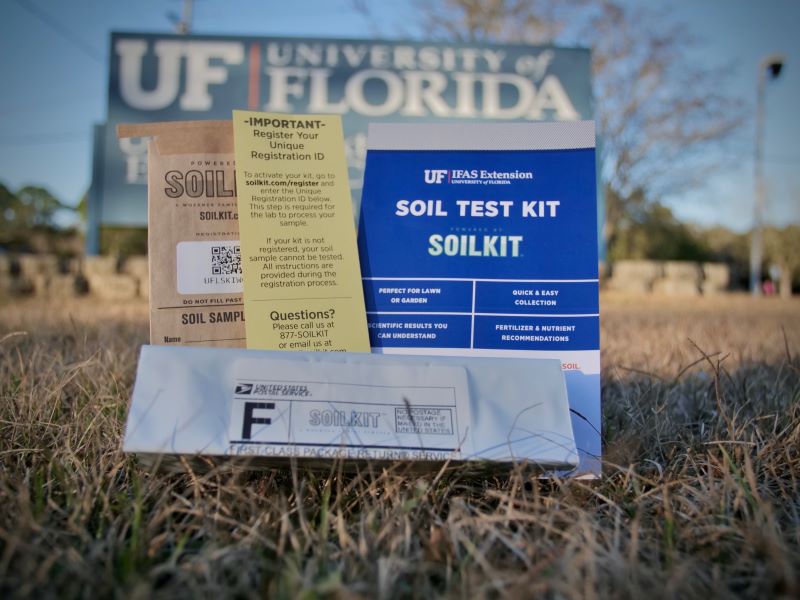A soil test can help you:
- Save time and money on lawn and garden maintenance
- Reduce nutrients leaching into groundwater
- Choose plants that are right for your landscape
- Comply with local fertilizer ordinances
UF/IFAS Extension offers homeowners a new option for easy-to-use soil testing.
If you’re a homeowner who wants to create a beautiful, Florida-friendly landscape, few things are more frustrating than planting a new shrub that withers and dies, or putting in lush, green sod only for it to shrivel and turn brown.
A lot of this frustration can be prevented by getting your soil tested.
If you go to the doctor for your annual checkup, one of the first things they’ll ask you for is a blood test. Even if you’re feeling great, a blood test forms a baseline of information the doctor can use to recommend treatments to maintain or improve your health.
The same goes for your soil. Getting your soil tested is the best way to understand the composition of your soil and what it needs to support the greenery you want to grow.
There are four main things a soil test can reveal about your soil:
Soil pH
Soil pH is the measure of how acid or alkaline your soil is—low pH is acidic; high pH is alkaline. Florida’s soils tend to be in a neutral range of pH 6.0 – 7.5. This is good for many of kinds of turfgrass and ornamental plants grown in Florida. However, some popular plants, such as azaleas, camellias, or blueberries, grow best in acidic soils (4.5 – 5.5 pH). The level of pH also affects the ability of plants to absorb certain nutrients.
Nutrients
The three most important plant nutrients are Nitrogen, Phosphorus and Potassium, often called potash. If your soil is deficient in any of these vital nutrients, your plants will struggle to grow. Nitrogen (N) is a major component of chlorophyll (the green pigment in plants), necessary for plant growth. Phosphorus (P) helps supply energy to the plant and also builds proteins. Potassium (K), is involved with transporting nutrients and exchanging gases within the plant. Fertilizers are the most convenient way to give your plants the proper amounts of vital nutrients.
When you pick up fertilizer at your local garden center, you’ll see three numbers on the bag: The numbers stand for the ratio of Nitrogen, Phosphorus and Potassium in the mix. A 10-10-10 fertilizer contains 10% Nitrogen, 10% Phosphorus, and 10% Potassium.
Applying the proper amount of fertilizer is not only good for your plant health, it’s good for the environment as a whole. For example, most Florida soils already contain a sufficient amount of phosphorus for plant and turfgrass health. In fact, phosphorus mining is a major industry in the state. When you put extra phosphorus into the soil, it leaches into the groundwater, eventually leading to degraded water quality and harmful algal blooms.
Micronutrients
Soil also contains a diversity of other elements, like Iron (Fe), Calcium (Ca) Magnesium (Mg), Zinc (Zn), Copper (Cu), and Manganese (Mn). These are usually present in small amounts, but they can have large effects on plant health.
Organic Matter
Finally, soil is alive with organic matter–plant residue, animal tissue and animal waste that, as they decompose, support a rich population of soil microorganisms. Soil rich in organic matter increases the nutrient content of the soil and improves its water-holding capacity, so you waste less water irrigating your lawn. In fact, every 1 % increase in soil organic matter can increase the ability to retain water up to 20,000 gallons per acre. Composting, mulching, vermiculture and other methods can boost the organic matter content of your soil.
Soil chemistry is complex, and soil testing is best handled by reputable laboratory, such as the UF Extension Soil Testing Lab. However, getting a soil test is easy and inexpensive. Compared to the cost of replacing a lawn or applying water and fertilizer without results, it’s a bargain.
SoilKit Soil Testing Kits
UF/IFAS Extension has been providing inexpensive soil testing services for many years. Starting this month, we’re offering homeowners a new option. We’ve partnered with AgriTech Corp. to offer SoilKit®, an easy-to-use soil testing kit.
SoilKits come with a soil collection bag, a pre-paid mailing label, instructions on how to take soil samples and a link to register your soil sample. The registration fee for soil testing is $29.95 (introductory rate—normally $31.95). After you register and use the instructions to take soil samples, mail them off to the lab and you’ll get results usually within two business days after they’re received.

SoilKits test for pH, nutrients, micronutrients and organic matter. The results come with recommendations for the specific types and amounts of lime, fertilizer and other amendments needed. All the guesswork is taken out of fortifying your soil, and there are even links to where you can find what you need.
SoilKit also links up with GPS data, so the results you receive are tailored to your location, and local fertilizer ordinances are accounted for.
You can pick up SoilKit® soil testing kits at your local UF/IFAS Extension office, or order online at https://soilkit.com/product/university-of-florida-soil-test-kit/
Why not make a late New Year’s resolution to get your soil tested?
Armed with the results, you can start thinking strategically and apply exactly what’s needed, when it’s needed, so you can have a beautiful home landscape while saving money, time and the environment.
 1
1
